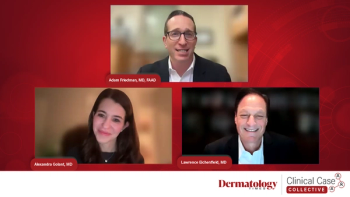
Impact of Vitiligo on the Mental Health of Patients
Chesahna Kindred, MD, MBA, FAAD, reviews mental health issues that patients with vitiligo are at increased risk for.
Episodes in this series

Heather Woolery-Lloyd, MD:Now, [Dr Kindred,] beyond the physical appearance of vitiligo, we know that that vitiligo can definitely impact mental health. What are the mental health issues that you’ve seen in your patients who have vitiligo?
Chesahna Kindred, MD, MBA, FAAD: I found for my vitiligo patients, especially if they’re new patients, I have to ask, but for the ones I know, they will be very forthright in how it’s affecting them. Generally, there’s a sense of insecurity, low self-esteem for my patients, and it’s backed up by evidence. Studies show that about 80% of our patients overall have some sort of psychiatric morbidity. That’s including major depressive disorder in more than 50% of the patients [and] social phobia in about 70%. We’re just talking about skin color in those with melanin-rich skin. All the patients in the study had major depressive disorder and a higher incidence of social phobia, higher risk of suicide, and lower self-esteem compared [with] our lighter-skinned patients. On that note, from my patients who have very fair skin where they can’t quite see the vitiligo as easily, I first have to ask, “does it bother you?” Because sometimes it doesn’t. But I never get that answer for my patients with a really rich complexion.
Heather Woolery-Lloyd, MD: I agree. Especially as I mentioned, when vitiligo is on the face, it’s something that is connected to a lot of our patients of color. Their identity, their skin color is connected to their identity. Losing skin color on the face, on a very obvious part of the body, like the face, tremendously impacts self-esteem and even self-identity. I’ve definitely seen that in my patients. Have you seen that?
Chesahna Kindred, MD, MBA, FAAD: Absolutely. And culturally. Certain cultures, if there’s such a huge stigma attached to it, and for me and my patients, it tends to be those who are Indian, Pakistani, more than any other group. Also, my children [patients]. That’s huge. That’s almost for any skin disease, for the kiddos. I’ve had to be hyperaware in those populations.
Heather Woolery-Lloyd, MD: I agree. And to just expand on that a little bit, teenagers. I have been practicing now for a little over 20 years, and I’ve been following some patients from early childhood, where they may or may not notice when they’re really young. But once those patients become teenagers and are in middle school and high school, that’s difficult enough as it is. Then to have a skin disease that’s so visual and obvious, I think, can be really challenging. I’m a big believer in understanding how important quality of life is. I think that it’s very important for us to recognize that vitiligo has this tremendous impact on quality of life in all of those affected, but particularly in these certain groups.
Transcript edited for clarity.
Newsletter
Like what you’re reading? Subscribe to Dermatology Times for weekly updates on therapies, innovations, and real-world practice tips.










